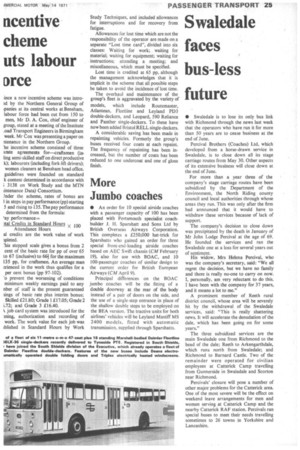neentive cheme uts labour Drce
Page 27

If you've noticed an error in this article please click here to report it so we can fix it.
ince a new incentive scheme was introxi by the Northern General Group of ['milks at its central works at Bensham, labour force had been cut from 150 to men, Mr D. A. Cox, chief engineer of group, stated at a meeting of the Institute .oad Transport Engineers in Birmingham week. Mr Cox was presenting a paper on ntenance in the Northern Group.
he incentive scheme consisted of three Irate agreements for—craftsmen (inling semi-skilled staff on direct productive k); labourers (including fork-lift drivers); women cleaners at Benshann head office. guidelines were founded on standard k content determined in accordance with 3138 on Work Study and the MTN tintenance Data) Consortium.
Jnder the scheme, rates of bonus are I in steps in pay performance (pp) starting 5 and rising to 135. The pay performance determined from the formula: lay performance= )tal Credits in Standard Hours Attendance Hours X 100 at credits are the work value of work tpleted.
This stepped scale gives a bonus from 2 cent of the basic rate for pp of over 65 to 67 (inclusive) to 66i for the maximum 135 pp, for craftsmen. An average man orienced in the work thus qualifies for a per cent bonus (pp 97-102).
'o prevent the worsening of conditions minimum weekly earnings paid to any nber of staff is the present guaranteed Ungs of basic rate plus interim bonus; Skilled £21.80; Grade 1 £17.05; Grade 2 i.72; and Grade 3 £16.40.
lk job card system was introduced for the ming, authorization and recording of work. The work value for each job was iblished in Standard Hours by Work Study Techniques, and included allowances for interruptions and for recovery from fatigue.
Allowances for lost time which are not the responsibility of the operator are made on a separate "Lost time card", divided into six classes: Waiting for work; waiting for material; waiting for equipment; waiting for instructions; attending a meeting; and miscellaneous, which must be specified.
Lost time is credited at 65 pp, although the management acknowledges that it is implicit in the scheme that all possible steps be taken to avoid the incidence of lost time.
The overhaul and maintenance of the group's fleet is aggravated by the variety of models, which include Routemaster, Atlantean, Fleetline and Leyland PD3 double-deckers, and Leopard, 590 Reliance and Panther single-deckers. To these have now been added Bristol RELL single-deckers.
A considerable saving has been made in repainting vehicles. Formerly the group's buses received four coats at each repaint. The frequency of repainting has been increased, but the number of coats has been reduced to one undercoat and one of gloss finish.




































































































